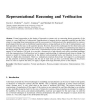Free Online Productivity Tools
i2Speak
i2Symbol
i2OCR
iTex2Img
iWeb2Print
iWeb2Shot
i2Type
iPdf2Split
iPdf2Merge
i2Bopomofo
i2Arabic
i2Style
i2Image
i2PDF
iLatex2Rtf
Sci2ools
123
click to vote
FAC
2000
2000
Representational Reasoning and Verification
Formal approaches to the design of interactive systems rely on reasoning about properties of the t a very high level of abstraction. Specifications to support such an approach typically provide little scope for reasoning about presentations and the representation of information in the presentation. In contrast, psychological theories such as distributed cognition place a strong emphasis on the role of representations, and their perception by the user, in the cognitive process. However, the post-hoc techniques for the observation and analysis of existing systems which have developed out of the theory do not help us in addressing such issues at the design stage. Mn this paper we show how a formalisation can be used to investigate the representational aspects of an interface. Our goal is to provide a framework to help identify and resolve potential problems with the representation of information, and to support understanding of representational issues in design. We a model for linking pro...
Related Content
| Added | 18 Dec 2010 |
| Updated | 18 Dec 2010 |
| Type | Journal |
| Year | 2000 |
| Where | FAC |
| Authors | Gavin J. Doherty, José Creissac Campos, Michael D. Harrison |
Comments (0)

